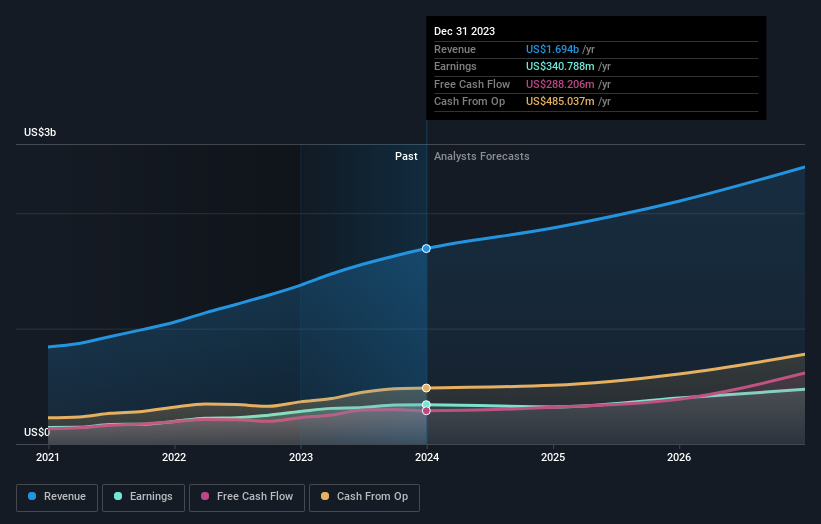Analysts Are Updating Their Paycom Software, Inc. (NYSE:PAYC) Estimates After Its Yearly Results
Last week saw the newest annual earnings release from Paycom Software, Inc. (NYSE:PAYC), an important milestone in the company's journey to build a stronger business. Results were roughly in line with estimates, with revenues of US$1.7b and statutory earnings per share of US$5.88. This is an important time for investors, as they can track a company's performance in its report, look at what experts are forecasting for next year, and see if there has been any change to expectations for the business. So we gathered the latest post-earnings forecasts to see what estimates suggest is in store for next year.
See our latest analysis for Paycom Software
Taking into account the latest results, the current consensus from Paycom Software's 21 analysts is for revenues of US$1.87b in 2024. This would reflect a decent 11% increase on its revenue over the past 12 months. Statutory earnings per share are expected to reduce 6.8% to US$5.62 in the same period. Before this earnings report, the analysts had been forecasting revenues of US$1.87b and earnings per share (EPS) of US$5.62 in 2024. The consensus analysts don't seem to have seen anything in these results that would have changed their view on the business, given there's been no major change to their estimates.
The analysts reconfirmed their price target of US$203, showing that the business is executing well and in line with expectations. There's another way to think about price targets though, and that's to look at the range of price targets put forward by analysts, because a wide range of estimates could suggest a diverse view on possible outcomes for the business. The most optimistic Paycom Software analyst has a price target of US$260 per share, while the most pessimistic values it at US$160. This shows there is still a bit of diversity in estimates, but analysts don't appear to be totally split on the stock as though it might be a success or failure situation.
One way to get more context on these forecasts is to look at how they compare to both past performance, and how other companies in the same industry are performing. It's pretty clear that there is an expectation that Paycom Software's revenue growth will slow down substantially, with revenues to the end of 2024 expected to display 11% growth on an annualised basis. This is compared to a historical growth rate of 21% over the past five years. By way of comparison, the other companies in this industry with analyst coverage are forecast to grow their revenue at 6.4% annually. So it's pretty clear that, while Paycom Software's revenue growth is expected to slow, it's still expected to grow faster than the industry itself.
The Bottom Line
The most important thing to take away is that there's been no major change in sentiment, with the analysts reconfirming that the business is performing in line with their previous earnings per share estimates. Fortunately, they also reconfirmed their revenue numbers, suggesting that it's tracking in line with expectations. Additionally, our data suggests that revenue is expected to grow faster than the wider industry. There was no real change to the consensus price target, suggesting that the intrinsic value of the business has not undergone any major changes with the latest estimates.
With that in mind, we wouldn't be too quick to come to a conclusion on Paycom Software. Long-term earnings power is much more important than next year's profits. We have estimates - from multiple Paycom Software analysts - going out to 2026, and you can see them free on our platform here.
It is also worth noting that we have found 1 warning sign for Paycom Software that you need to take into consideration.
Have feedback on this article? Concerned about the content? Get in touch with us directly. Alternatively, email editorial-team (at) simplywallst.com.
This article by Simply Wall St is general in nature. We provide commentary based on historical data and analyst forecasts only using an unbiased methodology and our articles are not intended to be financial advice. It does not constitute a recommendation to buy or sell any stock, and does not take account of your objectives, or your financial situation. We aim to bring you long-term focused analysis driven by fundamental data. Note that our analysis may not factor in the latest price-sensitive company announcements or qualitative material. Simply Wall St has no position in any stocks mentioned.

